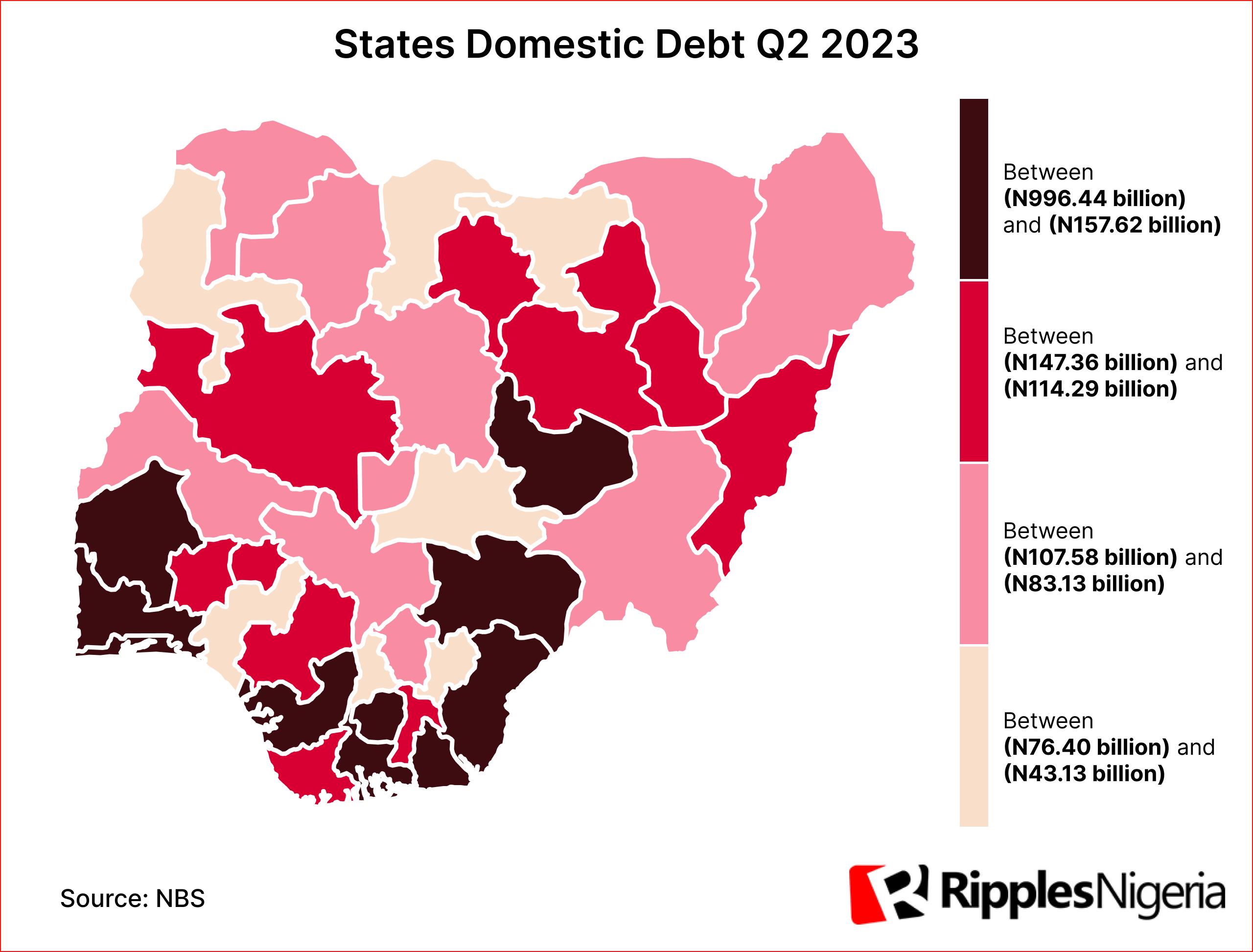Ripples Metrics
RipplesMetrics: Lagos’ total debts surpasses that of N’West, N’East and N’Central regions

The National Bureau of Statistics (NBS) published that Nigeria’s public debt stock rose to N87.38 trillion in the second quarter of 2023 (April to July).
The public debt stock includes the total domestic debts and external debts for the quarter. According to the bureau, the debt stock increased by 65.27 per cent from N49.85 trillion reported in the first quarter of the year.
In the dollar exchange (USD), this is a rise from $108.30 billion to $113.42 billion.
NBS said, “Total external debt stood at N33.25 trillion (US$43.16 billion) in Q2 2023, while total domestic debt was N54.13 trillion (US$70.26 billion). The share of external debt (in naira value) to total public debt was 38.05% in Q2 2023, while the share of domestic debt (in naira value) to total public debt was 61.95%.”
Breaking it down by category, the total domestic debt for the Federal government is N48.31 trillion, while for the 36 states and FCT is N5.82 trillion. Also, external debts for the federal government stood at N29.9 trillion, while the 36 states and the Federal Capital Territory’s external debts were N3.35 trillion.
For this report, RipplesMetrics looked into the states’ domestic debt observing some key findings in the growth within three months.
According to NBS, the domestic debt stock released was for 31 states. The domestic debt stock figures for Kebbi, Ogun and FCT were as of March 30, 2023. This is N60.94 billion, N293.20 billion and N84.77 billion respectively.
Also, the domestic debt for Kano State was as at December 31, 2022. This is N122.36 billion. The domestic debt stock for Katsina state was as at September 30, 2022, which is N62.37 billion. For River State, the domestic debt reported as of September 30, 2021, was N225.50 billion.
READ ALSO:RipplesMetrics… 100 DAYS: Highlighting the data across Tinubu’s 8-point agenda
According to the record, these six states neither experienced growth nor a decrease in their domestic debts.
However, RipplesMetrics findings showed that 14 out of the 31 states reduced their debts by. combined average of 1.81 per cent. These states are Adamawa, Akwa-Ibom, Anambra, Borno, Edo, Gombe, Jigawa, Kwara, Nasarawa, Ondo, Osun, Sokoto, Taraba and Zamfara.
The highest drop was in Adamawa state, from N130.98 billion to N127.75 billion and in Sokoto state from N93.70 billion to N91.68 billion.
On the contrary, the 17 other states increased their domestic debts by a combined average of 83.14 per cent. Lagos state recorded the highest domestic debt in Q2 2023 with N996.44 billion, followed by Delta with N465.40 billion. Meanwhile, Jigawa state recorded the lowest domestic debt with N43.13 billion, followed by Kebbi with N60.94 billion.
When categorized by geo-political region, States in North Central had a combined debt of N823.64 billion, while North East states had N677.71 billion and North West states with N564.08 billion. In the southern region, the South East states had a total debt of N609.05 billion, while the South-South states had N1.36 trillion and the South West with N1.79 trillion.
Lagos’ overwhelming debts
An overview of the data shows that the domestic debt in Lagos state alone is higher than states in the North West, North East and North Central regions.
The NBS data shows that Lagos increased its domestic debt from N533.81 billion to N996.44 billion in two years. This is an increase of 86.66 per cent from Q2 2021 to Q2 2023.
Lagos is estimated to have more than 26 million people. If the domestic debt is broken down per capita, each person living in Lagos owes N38,324.62. This is more than N8000 higher than Nigeria’s N30,000 minimum wage approved by the federal government.
By James Odunayo
Join the conversation
Support Ripples Nigeria, hold up solutions journalism
Balanced, fearless journalism driven by data comes at huge financial costs.
As a media platform, we hold leadership accountable and will not trade the right to press freedom and free speech for a piece of cake.
If you like what we do, and are ready to uphold solutions journalism, kindly donate to the Ripples Nigeria cause.
Your support would help to ensure that citizens and institutions continue to have free access to credible and reliable information for societal development.
























